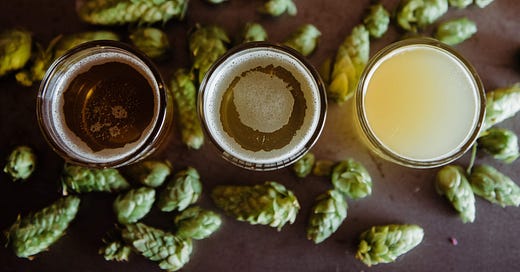Raising the bar on sustainability with purpose and collaboration
As the creator of a third of the world’s greenhouse gas emissions, food production is a large contributor to the climate crisis. Yet nearly a third of that food is wasted. Toast Ale, a UK-based brewing company, is among the businesses aiming to tackle this food waste problem head on. Using surplus bread to brew beer, they hope to create a circular economy that produces tasty, sustainable beverages. Their circular economy model, which is regenerative by design, reduces the need for barley by using bread that otherwise would go to waste. This practice is designed to use less land, water, and energy, and avoid carbon emissions.
One thing that stood out to me in learning about Toast Ale’s history is how social entrepreneurship can create significant institutional spillovers. In developing their own businesses, entrepreneurs often create innovative models that can then be spread to other organizations. As Louisa Ziane, the co-founder and chief operating officer at Toast Ale told me: “over the past six years we've refined the process of sourcing our bread — tracing allergens in ingredients, food safety etc – and processing the bread to reduce to the size (similar to a crouton), and moisture content (we dry it in a bakery environment using the residual heat of the ovens).” Thus, to further its broader mission, Toast Ale then works with other companies to incorporate surplus bread in their brewing, advising them “recipe development, the percentage of bread versus malt, how to incorporate it into the mash and so forth.”
Louise also told me about Toast Ale’s unique business model and how the company was born from the desire to do something about our environmental crisis. Below are some key points from my Forbes article on Toast Ale:
Toast Ale has three important goals. One, to maximize the use of surplus bread. Two, to raise funds for charitable work. Three, to raise awareness about food waste. Remarkably, the company spends all its profit to fixing the food system. “We’ve set up a model to distribute profits to charity partners rather than to shareholders, and commit at least 1% of revenue to ensure our charity partners have a reliable stream of income,” Ziane says. “We’ve also devised a funding model called Equity for Good, which requires our investors to commit to reinvest their net capital gains whenever they sell shares into other businesses with an environmental mission.”
Ziane believes that collaboration is the key to achieve their goals. “We wanted to set an example to show that businesses are capable and willing to do that, and that we expect governments to be doing the same. So the idea was born that we take our collaborative way of working to the next level with 26 simultaneous collaborations,” she says. “We choose to work with breweries that would normally be considered our competitors and show that we could work together to create change.”
Toast Ales managed to include some larger companies in their campaign. Ziane says “it was important to personally connect with someone senior in the large businesses so their teams had approval to continue to build on the relationship.” “Another important thing we did,” she adds, “was we made sure that we understood the businesses we were asking to get involved in the project as much as possible.”
Ziane says collaboration brings lots of surprises that are mostly positive, for example, “how willing the other breweries were to sign up with us and how supportive they were throughout the entire process, even in supporting the product sales.” Growing customer base proves to be challenging. “New audiences presented a new communication challenge,” she says. “If we do this again, we’ll do it on a smaller scale and engage with our customers to understand what people wanted in terms of beer styles, price point etc.”
Apart from collaboration with other businesses, Toast Ales also partnered with charities including Rainforest Trust UK and Soil Heroes Foundation. “With both of these organizations, we liked that they offered measurable ways to talk about the positive impact each of our customers had on the environment - the number of trees protected or the amount of carbon drawn down,” Ziane says. “I wanted people to be able to buy our beer and know what they were supporting; to make it a little more tangible to the consumer.”
Ziane says that purpose at the heart of corporate activism “It’s all about finding your purpose,” she says. “What matters to you? What campaigns can you work on that will help to solve a problem within your industry, whether that’s food systems or fashion or energy? Find other organizations that align with that mission with whom you can collaborate.”
When it comes to waste, the phrase “ waste is a design flaw” never gets old. The fact that food waste is an industrial-wide also creates great opportunity for collaboration. As Ziane says, “There is power in working together – it’s hard work to set up, but more fun and rewarding in the long term.”




